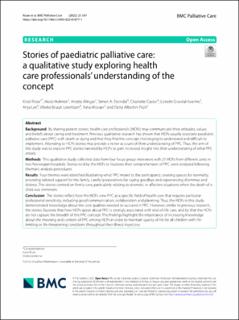| dc.description.abstract | Background By sharing patient stories, health care professionals (HCPs) may communicate their attitudes, values
and beliefs about caring and treatment. Previous qualitative research has shown that HCPs usually associate paediatric
palliative care (PPC) with death or dying and that they find the concept challenging to understand and difficult to
implement. Attending to HCPs’ stories may provide a richer account of their understanding of PPC. Thus, the aim of
this study was to explore PPC stories narrated by HCPs to gain increased insight into their understanding of what PPC
entails.
Methods This qualitative study collected data from four focus group interviews with 21 HCPs from different units in
two Norwegian hospitals. Stories told by the HCPs to illustrate their comprehension of PPC were analysed following
thematic analysis procedures.
Results Four themes were identified illustrating what PPC meant to the participants: creating spaces for normality,
providing tailored support for the family, careful preparations for saying goodbye and experiencing dilemmas and
distress. The stories centred on family care, particularly relating to dramatic or affective situations when the death of a
child was imminent.
Conclusion The stories reflect how the HCPs view PPC as a specific field of health care that requires particular
professional sensitivity, including good communication, collaboration and planning. Thus, the HCPs in this study
demonstrated knowledge about the core qualities needed to succeed in PPC. However, similar to previous research,
the stories illustrate that how HCPs speak about PPC is strongly associated with end-of-life care, and by that the HCPs
do not capture the breadth of the PPC concept. The findings highlight the importance of increasing knowledge
about the meaning and content of PPC among HCPs in order to maintain quality of life for all children with life-
limiting or life-threatening conditions throughout their illness trajectory. | en_US |

